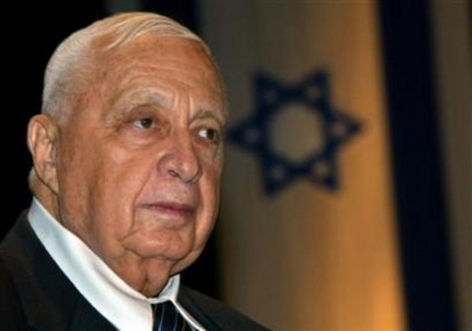DOUBLE TALK
Richard Cohen notes the difficulty confronting Ariel Sharon:
In Oliver Stone’s new HBO documentary about the Israeli-Palestinian struggle, Binyamin Netanyahu repeats what he has often said about Yasser Arafat: that he says one thing in English and another in Arabic. A different film might make a different point about Ariel Sharon: He says one thing in Hebrew and another thing in Hebrew.
Last month, for instance, Sharon explicitly showed that he understood that if Israelis and Palestinians are ever going to live in peace, some of the Jewish state’s controversial West Bank and Gaza Strip settlements will have to be dismantled. Sharon characterized this as “painful concessions” that Israel would have to make under the “road map” toward the eventual establishment of a Palestinian state. He referred specifically to two West Bank settlements.
“Our whole history is bound up with these places . . . Shiloh, Beit El,” he told the Israeli newspaper Haaretz. “And I know that we will have to part with some of these places. There will be a parting from places that are connected to the whole course of our history. As a Jew, this agonizes me.”
The other day — a different month, a different newspaper, the same language — Sharon said something different to the Jerusalem Post. When asked whether Jews would continue to live in Shiloh and Beit El, he replied, “Do you see a possibility of Jews living under Arab sovereignty? I’m asking you, do you see that possibility?” A moment earlier he flat-out said about Beit El, “Jews will live there.”
Clearly, no matter how much a leader desires peace, it is difficult to give up land considered part of one’s heritage. Cohen believes the time has come, courtesy of the rise of Abu Mazen, for President Bush to give Sharon a nudge:
There are two reasons for Bush to act. The first is that the Arab world is looking for some sign that Washington is not merely Israel’s proxy in the Middle East. The second reason — more important than the first, to my mind — is that Israel needs to be coaxed into doing what is best for Israel. The settlements, besides being a thorn in the side of the Palestinians and an insult to the Arab world, are also a burden to Israel. They have to be maintained. They have to be defended. In the long run this is untenable.
No doubt about it, although I’m frankly skeptical of any solution. Even if Sharon and Abu Mazen could agree to a deal, and even if Arafat could be kept in a box, there are other extremists, notably Hamas and other terrorist organizations, who will do everything in their power to hinder the process.






sharon said “And I know that we will have to part with some of these places”. ‘some’ is of course one way to talk about concessions without being pinned down on specifics – which probably are best left for actual negotiations, not media interviews. but ‘some’ also means ‘not all’ and so it is not contradictory to say that ‘jews will live there’ re any specific area. cohen had misread sharon’s words.
cohen also fails to make an important distinction between settlements. some (hebron, gaza) are heavy burdens to the IDF, some are minor burdens, and some are not burdens. The majority of settlers live in the suburbs of jerusalem, and these fall in the last two categories. many israelis including sharon do not consider them untenable, unlike say, gaza and hebron.
—